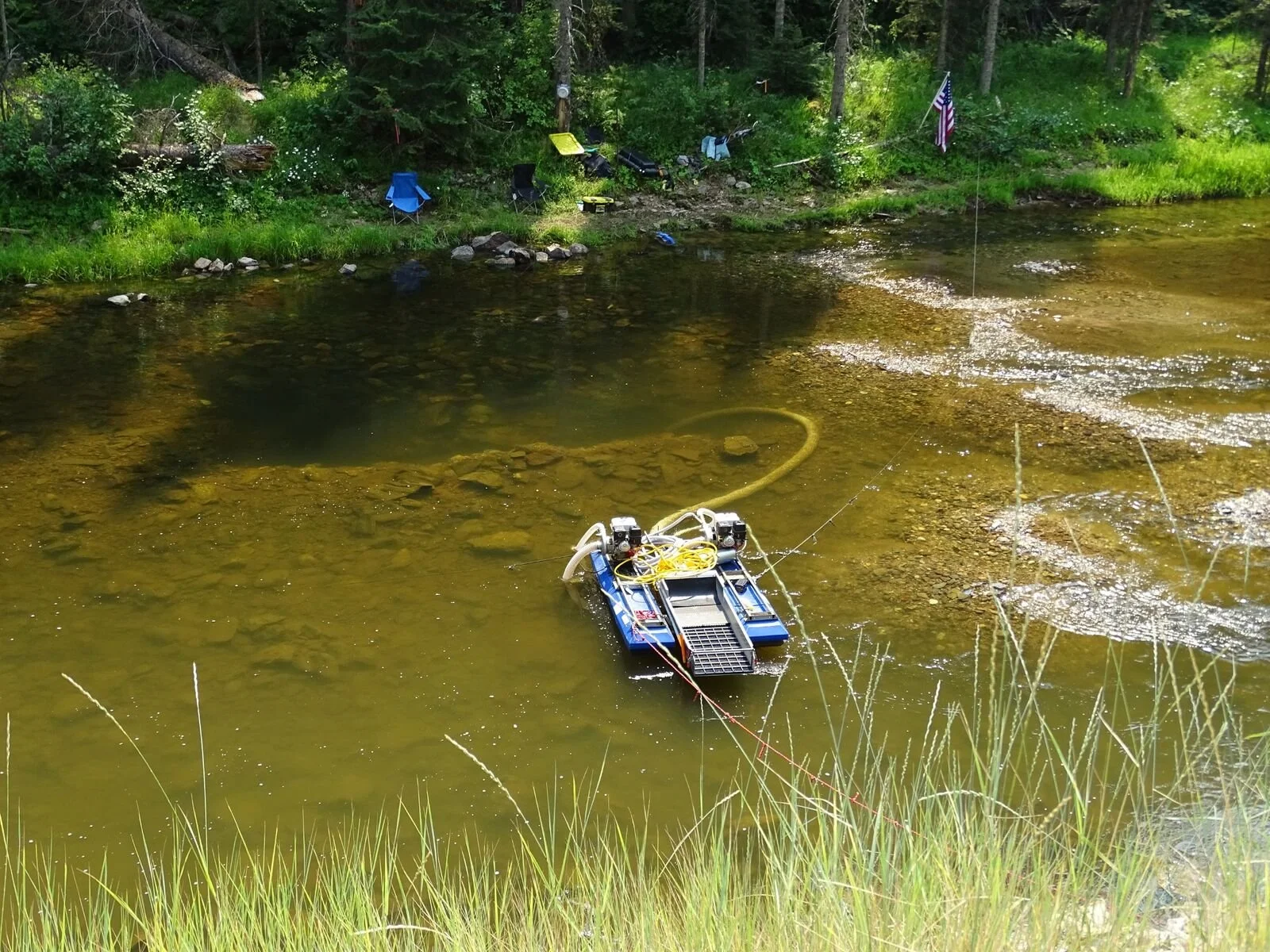Outlaw miners dredge up hefty fines
Miners who dredge for gold in Idaho’s rivers and streams are looking to hit it rich, but instead are paying steep fines when they choose to ignore laws designed to protect water quality, fish habitat, and other sensitive resources.Since 2020, miners who have flouted the rules have paid over $200,000 in penalties, up to $10,000 per day of illegal dredge mining. The Idaho Conservation League has long had concerns with recreational prospectors who use gas-powered machines to search for gold in Idaho’s rivers and streams. Known as suction dredges, these floating devices vacuum up stream bottoms, and spew out rocks, sediment, and other processed dredge spoils into the water. The mining method can wreak havoc on the riverbeds, harming water quality and fish habitat.  If you want to learn more, here’s an overview of some dredge mining requirements, along with some concerns that ICL and other fish advocates have raised.
If you want to learn more, here’s an overview of some dredge mining requirements, along with some concerns that ICL and other fish advocates have raised.
So, who’s getting fined?
Recently, the 9th Circuit Court of Appeals ruled in ICL’s favor in our long-running case against Shannon Poe, an outspoken California-based dredge mining advocate. Mr. Poe visited Idaho between 2014-2018, protesting dredge mining rules in the South Fork Clearwater River where he openly flouted requirements designed to protect water quality and endangered species. The 9th Circuit rejected each of Mr. Poe’s arguments and upheld the $150,000 penalty issued by an Idaho District Court Judge. Poe has petitioned for a rehearing of the case, but the unanimous decision from a three-judge panel will be difficult to overturn.Administrative cases filed by the Environmental Protection Agency (EPA) have also resulted in robust monetary penalties. During the 2018 dredge season, Mr. Poe encouraged other miners to join him on the South Fork Clearwater River. Several miners, including Carl Grissom of Richland, WA, took Poe up on his offer and dredge mined without necessary permits. In 2021, Grissom settled with EPA, admitting to the discharge of pollutants without a permit, and paid a $24,000 penalty. EPA also filed cases against Dave Erlanson of Swan Valley, ID and Robert Rice of Idaho Falls, ID, resulting in fines of $6,600 and $3,600, respectively.Finally, the State of Idaho won a case against George May, a Boise-based dredge miner who similarly opted not to secure a mandatory Clean Water Act permit before he dredged in Grimes Creek, near Idaho City. In April 2023, a judge ordered Mr. May to pay a $30,000 penalty, along with $2,500 in attorney’s fees. Penalties are paid to the U.S. Treasury (EPA and ICL cases) and the Idaho Treasury for state cases.
So what else is ICL doing about dredge mining?
ICL helped establish the Idaho Stream Channel Protection Act in the early 1980s, which required permits for activities that disturb streambeds, including suction dredge mining. We also encouraged the Idaho Department of Lands and the Idaho Land Board to control dredge mining, since the beds of navigable rivers are required to be protected under the Public Trust Doctrine by the Idaho Land Board.With gold prices quadrupling between 2000-2010, we saw a significant increase in dredge mining. In response, we urged the EPA to ensure Clean Water Act compliance, resulting in the issuance of a General Permit in 2013. The permit limited dredge mining across much of Idaho, but many miners refused to follow the new rules or apply for coverage under the permit. Across the state, we received reports of dredge mining in rivers and streams that provide important habitat for threatened and endangered species including salmon, steelhead, and bull trout. We initiated formal monitoring efforts across the state, and continue to send legal warning letters to dredgers who we believe may mine without required permits. In 2020, EPA transferred the permit to the Idaho Department of Environmental Quality (IDEQ). In early 2024, IDEQ is expected to release a revised version of the permit, and ICL will be reviewing it closely to ensure that important protections are retained. ICL will continue to advocate for stronger protections with state and federal agencies. Anglers, outfitters, boaters, irrigators, and others who use Idaho’s waters all work within rules and regulations to keep our rivers clean and healthy. Suction dredge miners should too.

